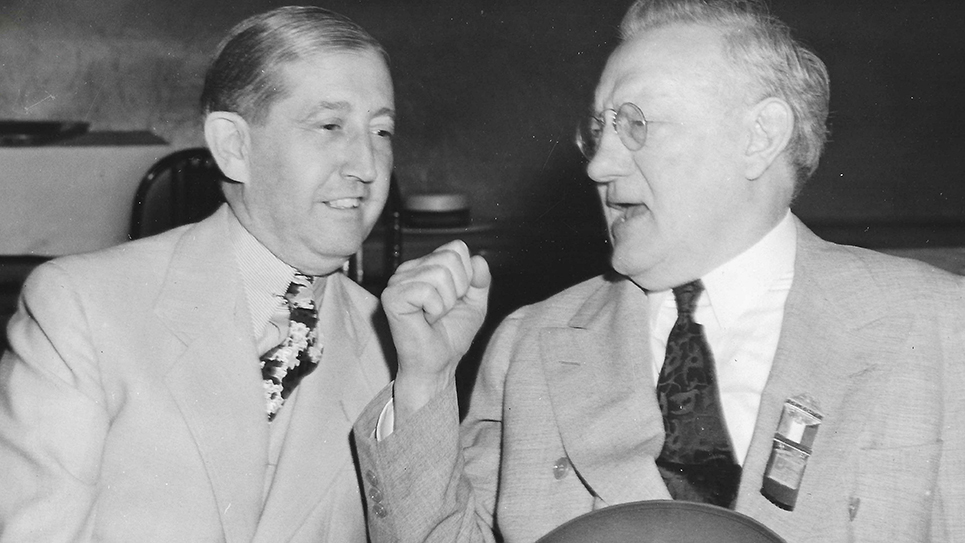‘Sunny Jim’
James E. Watson of Indiana
For half a century, James Eli Watson was an important factor in Indiana politics. For most of that time, Watson occupied a seat in either the U.S. House of Representatives or the United States Senate. A jovial fellow who was a prototype for the stereotype of a politician, Watson excelled in the statecraft of backslapping, handshaking, and kissing babies. Jim Watson’s affable and genial nature made him good company and his cheerfulness won him the sobriquet of “Sunny Jim.” A highly partisan and loud Republican, Watson was generally well-liked by his colleagues, including many Democrats. Watson could be blunt and was known for telling jokes to amuse both colleagues and constituents. “The best thing that could happen to this country would be to have Congress not meet for three years and have no State Legislature meet for four years,” Watson told a reporter.
Watson was an Old Guard Republican, profoundly loyal to the Grand Old Party. When asked by a reporter if he was in agreement that the Republican Party was all but over, Watson snapped, “No, sir I am not. What we need now is some old-fashioned party loyalty!” TIME magazine quipped, “Senator Watson’s optimism is not as sweet as the President’s (Warren G. Harding). But it is more specific.”
Once, returning to Washington, D.C., after having been in Indiana, Senator Watson informed his colleagues, “All would be well if we had dollar and a half wheat and ten dollar hogs.”
Throughout his time in politics, “Sunny Jim” Watson was one of those fellows who seemed almost impossible to dislike. TIME magazine once noted “if one were asked to pick a man in Washington who best typifies the popular idea of an old-style politician the choice would almost inevitably fall upon” Watson. The popular news magazine noted the senator’s handshake was “magnificent.” While once rivals, “Sunny Jim” became the Senate spokesman for the Hoover Administration. Yet Watson could be tart. When Democrat Wendell Willkie, a native Hoosier, became a Republican and captured the GOP president nomination, Watson archly said, “Back home in Indiana, we think it’s all right for the town whore to join the church, but we don’t let her lead the choir on the first night.”
“Sunny Jim” Watson had critics aplenty. National columnist Frank Kent once wrote of Senator Watson, “In Indiana you hear far more scathing denunciation of the Honorable Jim from prominent Republicans than you do from any Democrat. By outstanding men of his own party he is privately pictured as a blithering blatherskite, the most blatant bluff any State has sent to Washington in years – – – a disgrace to Indiana, a fraud and a faker.”
James E. Watson spent almost the entirety of his life in politics. Born in 1864, Watson was already campaigning for GOP candidates in Indiana during the 1880s. In 1894 Watson was the Republican nominee for Indiana’s Fourth Congressional District against Congressman William S. Holman, the Democrat incumbent. Watson won that election but lost reelection to Holman two years later. Watson made his own comeback in the 1898 election by running for and winning in Indiana’s Sixth District next door. Watson quickly became a close friend and aide to powerful House Speaker “Uncle Joe” Cannon. That friendship earned him a spot on the most desirable committee assignment in the House, the influential Ways and Means Committee. Determined to move up the political ladder, Watson opted not to seek reelection to the House of Representatives in 1908 but rather sought to be elected governor of Indiana. Jim Watson won the GOP nomination but was upset in the general election by Democrat Thomas R. Marshall, who would be elected vice president with Woodrow Wilson in 1912.
Following his defeat for the governorship, Jim Watson opened a law practice in his hometown of Rushville, but he remained a fixture on Capitol Hill where he lobbied on behalf of the American Manufacturer’s Association. Watson also remained a power in Indiana’s Republican Party and his support was much sought after by aspiring officeholders and applicants for federal and state jobs.
James E. Watson announced as a candidate for the United States Senate in 1916 in the hope of a political comeback. Watson and Harry New contested for the Republican nomination in a campaign that became increasingly bitter. Fate intervened when U.S. Senator Benjamin Shiveley died suddenly in March. With both of Indiana’s seats in the U.S. Senate up for election, both New and Watson were nominated to run in the general election. Both were victorious in the fall and Watson served the remaining four years of the late Senator Shiveley’s term.
Watson faced Thomas Taggart in the 1920 general election. Taggart was the boss of Indiana’s Democratic Party and it was a grudge match as the two had tangled before in the 1916 election. Watson won the 1920 contest and became one of the senators who were considered by the media of the day to be administration spokesmen for the occupant of the White House.
While many think the political strength during its revival in the decade of the 1920s was confined to the South, the truth is the Ku Klux Klan exhibited great influence in other states, including Indiana. The leading Klan figure in Indiana was D. C. Stephenson. When the fearless Senator James A. Reed of Missouri was investigating corruption in other states, his attention drifted to Stephenson and Indiana. The former Klan leader was already in jail for murder and when called to testify, suddenly had little to say. D. C. Stephenson invoked his constitutional right not to incriminate himself.
“Sunny Jim” Watson was less than happy. Watson complained to a reporter, “Last week my name was tossed about in newspaper headlines because of two events. Neither one of them pleased me. I was linked with the sensational K.K.K. investigation in Indiana, a fact which my opponents say will damage my chances for re-election to the Senate. Then I was injured in an automobile accident near Indianapolis. My car went into a ditch to save crashing into another machine. I received a scalp wound which it took ten stiches to close, a sprained wrist and ankle, many bruises. I will be in the hospital for a week.”
Senator Jim Watson was still confined to a hospital when Reed came a-calling to Indiana and summoned his colleague to his sick bed. Watson told Reed he had never been a member of the KKK. “As to Stephenson,” Watson said, “I knew him. All politicians in Indiana knew Stephenson … I was always afraid to give him any confidence, and never did, because there was something about the man that always warned me not to do it. I was afraid he might push out, because he was, in a way a human dynamo and, at the time of his supremacy, might have controlled 150,000 votes in Indiana … ”
Senator Reed, clearly disappointed, hopped on a train bound for Missouri and growled, “I have more important things to do … ”
Watson’s entire political career had been aimed at a single target: the presidency of the United States of America. Having been reelected to the Senate in 1926, Watson thought 1928 might be his year as President Calvin Coolidge had said he “chose not to run” that year. Herbert Hoover, secretary of commerce during the administrations of Warren G. Harding and Coolidge, was well ahead in his pursuit of the GOP nomination. Watson and others tried to stop Hoover’s momentum, but they were unsuccessful. For his running mate, Hoover picked another presidential aspirant, Senator Charles Curtis of Kansas, the Senate’s majority leader. The Hoover-Curtis ticket won an overwhelming victory. With Charles Curtis assuming the vice presidency, Senate Republicans met to choose a new majority leader; they chose Jim Watson.
The popularity of Herbert Hoover came crashing down with the collapse of the stock market and the onset of the Great Depression. As the Depression deepened, the American people became more restive and worried.
Watson recalled he well understood the position he was in when he sought reelection in 1932. Few people thought Herbert Hoover could win a second term in the White House and privately, Senator Watson believed Hoover would be defeated and take the entire Republican ticket down with him. Indiana Democrats had nominated a strong statewide ticket to ride Franklin Roosevelt’s coattails. As he fully expected, Jim Watson lost the election to Frederick Van Nuys, who had little experience in elective office.
Resilient, James E. Watson affiliated himself with an insurance company in Indiana and resumed his career as a lawyer-lobbyist in Washington, D.C. It quickly became quite clear the former senator never considered himself done with politics, or more importantly, that politics was done with him. Watson retained considerable clout back home in Indiana in GOP circles. The former senator watched as his one-time colleague, Arthur R. Robinson, went down to defeat in 1934. Both of Indiana’s U.S. senators were Democrats after March 3, 1935.
Nobody was surprised when the 73-year-old former senator announced in February of 1938 that he was running to reclaim his seat in the United States Senate. Watson naturally pointed to his long service in Washington as a good reason to make him a candidate to return to the Capitol as a lawmaker. At the time, Indiana Republicans selected their senatorial nominees not by primaries but through statewide conventions. Several other Republicans were off and running for the GOP senatorial nomination, but the opposition to Watson coalesced around the candidacy of Raymond E. Willis, a popular small-town newspaper owner and publisher. Moreover, Willis also had the powerful backing of Governor Ralph Gates, who held all state patronage in his hands. Gates was deeply opposed to renominating James E. Watson, believing the former senator could not win the general election contest.
At the time, incumbent Frederick Van Nuys looked like a particularly inviting target, especially as there had been an effort by the leadership of Indiana’s Democratic Party bosses to remove the senator from the ticket. Van Nuys rattled fellow Democrats when the diminutive senator boldly announced if he were denied the Democratic nomination, he would run in the general election as an Independent, virtually assuring the election of a Republican. Van Nuys had opposed President Roosevelt’s plan to pack the Supreme Court, which caused some powerful Indiana Democrats to urge denying him their party’s nomination. Some Republicans, including the Fort Wayne News Sentinel, a GOP newspaper, had urged that Senator Van Nuys be given their own party’s nomination.
Watson and his wife returned to Rushville where they checked into the Lollis Hotel where friends and supporters could call on them before the state convention. Some of Watson’s support became wobbly as Republicans prepared to meet in convention due to the profound opposition of Governor Gates. Increasing the pressure on those delegates supportive of the former senator was the almost unanimous support by Indiana’s editorial association of newspapers for their colleague, Raymond Willis. Still, Watson had done many things for many Republicans and his support was deeply rooted in many Indiana counties.
“Sunny Jim” Watson was the acknowledged frontrunner for the Republican senatorial nomination when Republicans gathered in Indianapolis for their state convention on June 29. Virtually every political observer believed Watson would lead the first ballot. The strength of Raymond Willis at the convention surprised the former senator and just about everybody else. Willis led on every ballot before clinching the GOP nomination on the third ballot. At 62, Willis was more than a decade younger than Jim Watson. Willis had only barely nosed out Watson, receiving 444 votes as to Watson’s 442 on the first ballot. “Sunny Jim” Watson knew at that moment, his electoral career was behind him.
Watson assumed his role as an elder statesman of his party and returned to his law practice in Washington, D.C. The former senator remained interested and active for the next decade when he died unexpectedly at the age of 83 on July 29, 1948.
© 2025 Ray Hill







